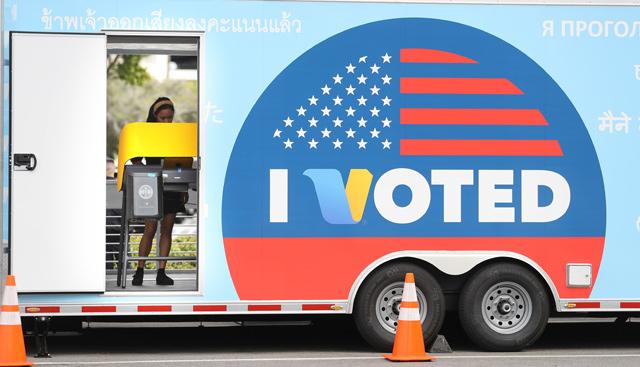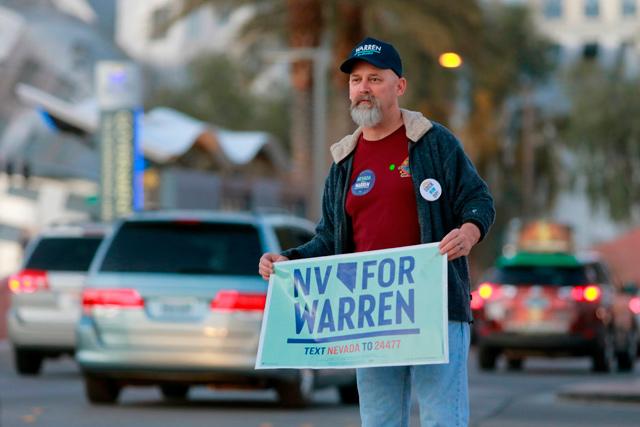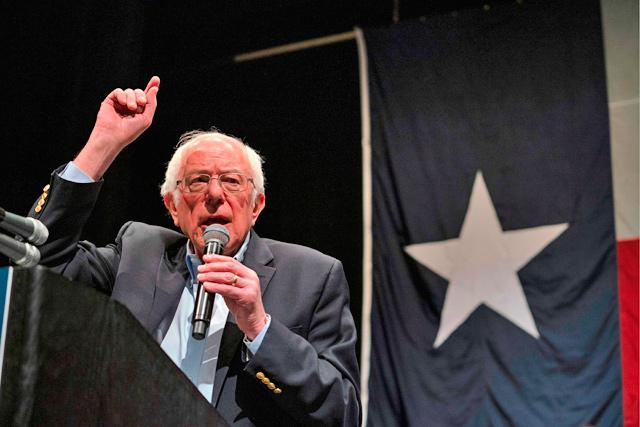You are here
California at heart of battle to choose Trump’s opponent
By AFP - Feb 29,2020 - Last updated at Feb 29,2020

A voter prepares her ballot during early voting for the California presidential primary election at a new LA County Mobile Vote Centre outside Universal Studios Hollywood on Thursday in Universal City, California (AFP photo)
LOS ANGELES — Left-leaning California has thrust itself back into the heart of the fight for the presidency in 2020, casting a potentially decisive vote Tuesday in the Democratic nominee to face Donald Trump.
The most populous state in the US had little say in 2016's race for the party's nominee, organising its Democratic primary as late as June, when the game was already up for Hillary Clinton's rival Bernie Sanders.
This time, California has brought its vote forward to March 3, marking a return to "Super Tuesday" in which 14 states will participate.
The idea is to cast its vote at a decisive moment in the race, just days after the important South Carolina primary.
Not known for being particularly mobilised in the past, Californians like Peter Fisher — a 44-year-old lab technician — are well aware that this year, their votes really can make a difference.
The primary is about "making sure that my vote goes for the candidate who will take the country in the right direction," he told AFP at a recent Bernie Sanders rally.
"You can see a difference this year... there are lots of candidates here, the ads on traditional TV are covered in candidates, social media advertising is heavy," said Christian Grose, a political scientist at University of Southern California in Los Angeles.
"It's just something people are talking about."
California voter registration has surged to a level not seen since the 1950s, with more than 20 million people signed up — out of an eligible 25 million.
Some 44 per cent of those are registered as Democrats, almost double the Republican electorate (23.6 per cent).
With more Democratic delegates — who ultimately pick the nominee — than any other state, "the fact that it's on Super Tuesday makes it the big catch of all of the early states," said Grose.
Beat Trump
"It's important to keep in mind that Democratic primary voters overwhelmingly disapprove of the job that President Trump is doing," said Mark Baldassare, president and CEO of the Public Policy Institute of California.
"When asked what they're looking for in a candidate... a very strong majority has consistently said 'we're looking for a candidate that can run against Donald Trump.'"
A poll conducted by Grose's USC Schwarzenegger Institute asked respondents to identify the main issues they felt were at stake in November's general election.
At number one came housing and homelessness — which has exploded on the West Coast — followed by climate change and immigration.
"The number four issue from voters, when asked without a list, is the president," said Grose, labelling the pick "surprising".
"The challenge is that nobody knows what qualities" will be needed to beat Trump, added Baldassare. "There are no objective criteria for that."
'Hard to stop'
Edgar Pedroza, a 25-year-old American bartender whose parents are from Mexico, believes Trump "is a horrible human being that reflects on us as a society, as a country".
Registered as an independent, Pedroza believes frontrunner Bernie Sanders is best-placed to beat Trump in November.
Recent polls in California show the self-proclaimed "democratic socialist" senator from Vermont on top with around 30 per cent support, well ahead of moderate former vice president Joe Biden and fellow progressive Senator Elizabeth Warren, who are neck-and-neck.
But the number of undecided voters and a complex electoral system make predictions difficult.
Candidates who score below 15 per cent are eliminated, and with competition so fierce some experts wonder whether only one or two others besides Sanders will break that barrier, leaving him with the bulk of California's delegates.
"If he's getting 40-45 per cent of delegates in California, it's going to be hard to stop", said Grose.
For Baldassare, it is the bigger picture of "Super Tuesday" that will determine the candidates' fates after March 3.
"California is going to be one of the determining factors," he said.
Indeed, the often-progressive state has not always proved visionary. In February 2008, it preferred Clinton to Barack Obama on "Super Tuesday" — a result which ultimately did not stop him reaching the White House.
Related Articles
MANCHESTER, United States — Bernie Sanders and Pete Buttigieg carried their fight for the Democratic presidential nomination to the nat
WASHINGTON — From glitzy Las Vegas casinos to dusty desert crossroads, Nevada Democrats vote on Saturday for who should challenge President
LAS VEGAS — Bernie Sanders' landslide victory in Nevada's Democratic nominating contest has scattered his moderate challengers and injected

















